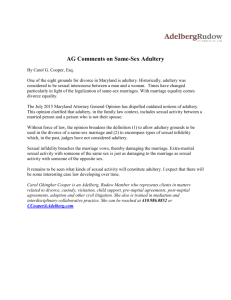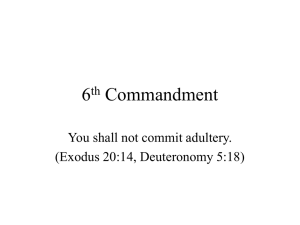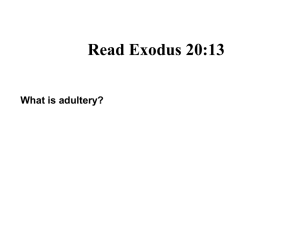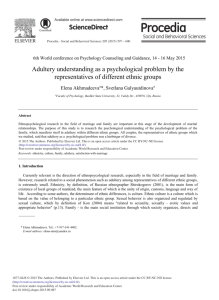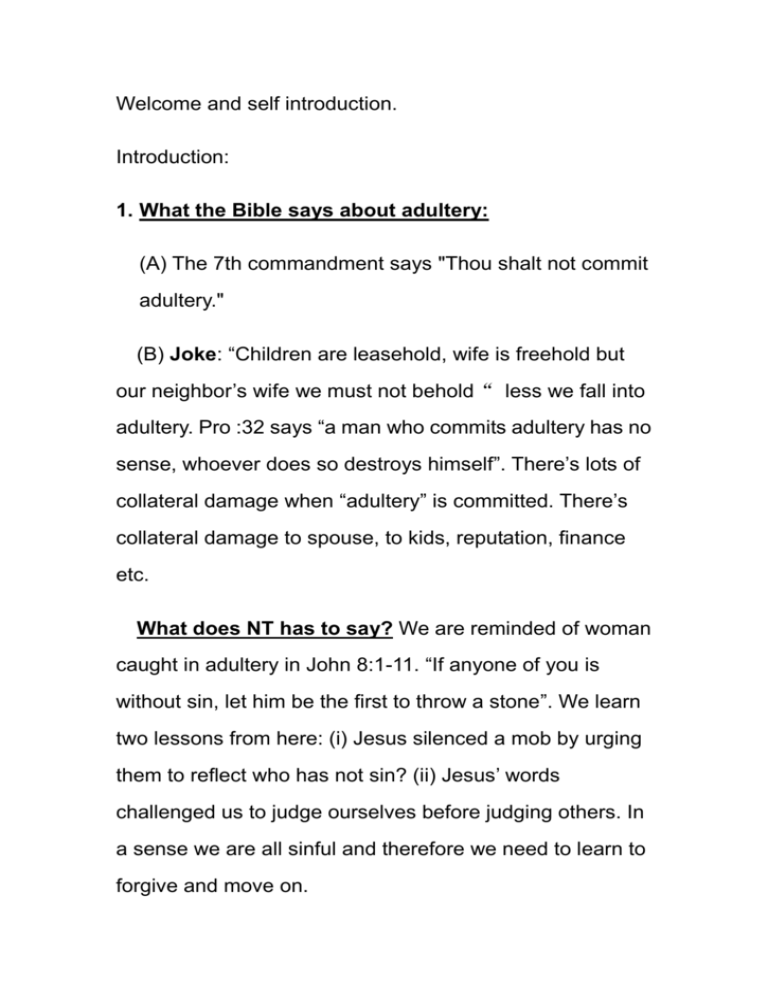
Welcome and self introduction.
Introduction:
1. What the Bible says about adultery:
(A) The 7th commandment says "Thou shalt not commit
adultery."
(B) Joke: “Children are leasehold, wife is freehold but
our neighbor’s wife we must not behold“ less we fall into
adultery. Pro :32 says “a man who commits adultery has no
sense, whoever does so destroys himself”. There’s lots of
collateral damage when “adultery” is committed. There’s
collateral damage to spouse, to kids, reputation, finance
etc.
What does NT has to say? We are reminded of woman
caught in adultery in John 8:1-11. “If anyone of you is
without sin, let him be the first to throw a stone”. We learn
two lessons from here: (i) Jesus silenced a mob by urging
them to reflect who has not sin? (ii) Jesus’ words
challenged us to judge ourselves before judging others. In
a sense we are all sinful and therefore we need to learn to
forgive and move on.
2. “Reality check” about the situation of adultery in
this world today. (i) Adultery is rampant and is on the
rise. (ii) A survey by the National Opinion Research
Center (University of Chicago) found: 25 percent of men
had been unfaithful and 17 percent of women had
betrayed their husband.(iii) Adultery is also a problem in
the church; “Christianity today” – a Christian magazine,
polled showed about 23% Christians had been unfaithful
to their spouse. (iv) The above are the bad news, the
good news is (a) Jesus is here to forgive. Regardless
of your past. Jesus wants to redeem and revitalize your
marriage. God is in the business of helping marriages
recover. (b) Adultery is “treatable”. Who would have
thought, just a decade ago, that adultery would come to
be viewed as “treatable” and is now a “common” difficult
problem in the Church
3. As we discuss on how to Affair Proof your marriage –
let’s look to the Lord in prayer.
Marital satisfaction falls quickly after the 3rd to 5th year of
marriage. This is especially so when babies arrive and
mothers give full attention to the needs of growing kids –
oftentimes neglecting the husband’s needs. It is particularly
acute when teens leave the home. When spousal
relationships are not nurtured throughout their marriage, or
when there’s no investment in marriage intimacy, the MSL
goes down the slope. (see chart A below)
MARITAL SATISFACTION
Marital
Marital Satisfaction
Satisfaction Levels
Levels
TIME
TIME MARRIED
MARRIED
Adolescents
Adolescents Depart
Depart
We will discuss 3 main points today:
(A) Types of Affair, (B) Contributing factors towards Affair
& (C) Preventive measures to take.
(A)
Types of Affair: --
(i) Class 1: One-night stand (David and Bathsheba in 2
Sam 11-12), Note: v3,4 showed that David do not know her.
They were strangers to each other. v6 to v27 David plotted
to killed Uriah. Uriah died. His wife mourned for him. Then
she married David. BUT v27b says: what David did
“displeased the LORD”.
(ii) Class 2: Entangled affair (Samson & Delilah – Judges
16). Note Samson was married in Judges 14. Samson
seems to have lost his mind. He knew Delilah was up to no
good that’s why 3 times he told her lies (v7, v11, v13).
Three times Delilah screamed at him for “making her a
fool” v10,13,15. It’s funny that whilst Samson knew Delilah
was trying to harm him, yet he remained in the relationship.
There’s a parallel here; people caught in an entangled
affair seems to like David who has lost their logic and mind,
yet they choose to remain in the entangled relationship,
why? Could there be some “inner need” that they are
hungering for in the affair that the marriage cannot provide
whilst at the same time losing their “mind” and logic.
(iii) Class 3: Sexual Addiction (Eli’s sons 1 Sam 2:22).
This is usually marked by the “unfaithful” having a string of
relationships with different partner over a period of time.
We will focus our talk on Class 2 affairs:
An affair has 3 ingredients: (a) prepared infidel. (b) Willing
partner and (C) secrecy.
(B) Contributing factors that allow affair to flourish
(B1) Three types of “affair-prone” marriages.
(i)
Empty Nest Affair --– this refers to couples
whose main purpose is to complete the
parenting project. Affair usually begins after kids
left for college, home is empty and “infidel” looks
for something else.
(ii)
Intimacy-Avoidant --– couple stay safe by
keeping each other at a distance. Regardless of
communication style (good or bad), they keep
marriage feel safe by doing/keeping things
predictable. One key symptom is the couple
“seldom look at each other’s eyes when they
talk”
(iii)
Conflict-Avoidant --- like a receiver’s dial tone.
Such relationship has “no emotional variation in
their relationship”. Sometimes, in order to avoid
conflict, one of the spouses will play a “child” in
order to please the “parent” spouse. Known as
“child-parent relationship” within a spousal
relationship.
(B2) Other risk factors – such as:
(i)
Personal (eg. sexual molestation, exposure to
unhealthy sexual activities or promiscuity, and
other learning disabilities/ADHD).
(ii)
Family History (eg. any parents/grandparents
who were unfaithful, pain & turmoil from
single/blended family, emotional or physical
abuse that were sustained when young or any
huge emotional deficit).
(iii)
Transitions in life (eg. Loss – when death of
loved ones or loss of job affected one’s view of
self, Life Changes – pregnancy, young babies,
teens left home for college and Moves – where
both spouse live in different cities, moving
family into new cities where all in family is
adjusting).
(iv)
Behavioral (be careful when one’s close friend
is the opposite sex or conjoint ministry partner
is the opposite sex or regular “soloing”).
(C) Preventive Measures:
(C1) Biblical reminders: (i) 1 Cor 7:5 – married couple to
explore and have fun-filled sexual relationship (ii) love her
like she wants and respect him like he needs it Eph
5:22-33. v33 – reminds us the basic foundation for a
healthy marriage is:
“Man needs respect and Woman
needs to feel loved”. Who defines “woman needs to feel
loved”? Answer: The wife. As long as wife does not feel
loved, husband has to work hard, adopt attitude of Christ,
and serve her till she feels “being loved”.
(C2) Practical suggestions:
(i) be willing to spend
money on your marriage (read A life well spent – Russ
Crosson (The eternal reward of investing in yourself and
your family). The key concept here is: leave a Posterity not
just prosperity.
(ii) create spikes in your marriage (eg.
bring wife out to have dates and leave kids at home, go for
short holidays without the kids talk ONLY about each other
– avoid talking about work, or kids).
(iii) Regularly discuss
about various “risk factors” that might affect you. Take time
to pray and learn to accept each other’s struggles.
(iv) Do a ranking on the 5 factors common to infidelity, talk
about each other’s ranking and try and work at the “top two
rankings”. The five factors that are common to infidelity are:
(i) Loss of fun, (ii) Lowered nurturance/care levels, (iii)
Financial conflicts, (iv) Sexual dissatisfaction, (v)
Power/Control issues.
Conclusion:
1. Look for marriage mentors. In church or in books.
Below are some recommendations:
(a) A life well
spent – Russ Crosson (The eternal reward of
investing in yourself and your family). (b) Saving
Your marriage before it starts – by Dr Les Parrott
& Leslie Parrott, (has 7 key questions for couples to
work through) (c) Article “How to keep the weeds
away”–Jim and Jerry White. Please take from Elder
Eddie Lawrimore. (d) The five languages of love: by
Dr Gary Chapman, (e) His Needs, Her Needs:
Building an Affair-Proof Marriage. By Dr William
Harley.


